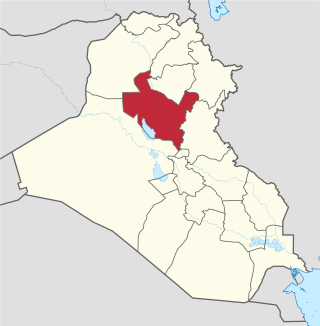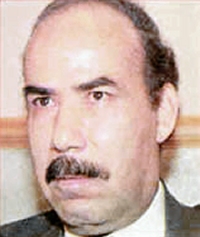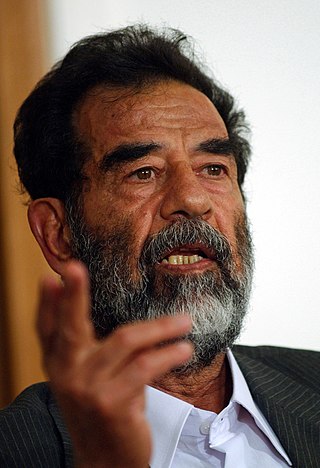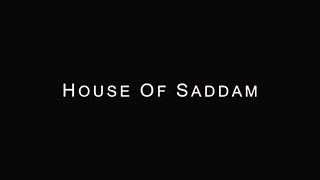
The Saladin, Salah ad Din, or Salah Al-Din Governorate is one of Iraq's 19 governorates, north of Baghdad. It has an area of 24,363 square kilometres (9,407 sq mi), with an estimated population of 1,042,200 people in 2003. It is made up of 8 districts, with the capital being Tikrit. Before 1976 the governorate was part of Baghdad Governorate.

Tariq Aziz was an Iraqi politician who served as Deputy Prime Minister (1979–2003), Minister of Foreign Affairs (1983–1991) and a close advisor of President Saddam Hussein. Their association began in the 1950s when both were activists for the then-banned Arab Socialist Ba'ath Party. He was both an Arab nationalist and a member of the Chaldean Catholic Church.
The Halabja massacre took place in Iraqi Kurdistan on 16 March 1988, when thousands of Kurds were killed by a large-scale Iraqi chemical attack. A targeted attack in Halabja, it was carried out during the Anfal campaign, which was led by Iraqi military officer Ali Hassan al-Majid. Two days before the attack, the city had been captured by Iran as part of Operation Zafar 7 of the Iran–Iraq War. Following the incident, the United Nations launched an investigation and concluded that mustard gas and other unidentified nerve agents had been used against Kurdish civilians. The United States Defense Intelligence Agency initially blamed Iran for the attack, though the majority of evidence later revealed that Iraq had used the chemical weapons to bolster an ongoing military offensive against Iran, pro-Iranian Kurdish fighters, and ordinary Halabja residents.

Barzan Ibrahim Hassan al-Tikriti, also known as Barazan Ibrahim al-Tikriti, Barasan Ibrahem Alhassen and Barzan Hassan, was one of three half-brothers of Saddam Hussein, and a leader of the Mukhabarat, the Iraqi intelligence service. As the head of the Mukhabarat, he was responsible for ordering the killings of dissidents. Despite falling out of favour with Saddam at one time, he was believed to have been a close presidential adviser at the time of his capture by U.S. forces in 2003. On 15 January 2007, Barzan was hanged for crimes against humanity. He was decapitated by the hangman's rope after errors were made calculating his body weight and length of drop from the platform.

The Islamic Dawa Party, is an Iraqi Shia Islamist political movement that was formed in 1957 by seminarians in Najaf, Iraq, and later formed branches in Lebanon and Kuwait. The Party backed the Iranian Revolution and also Ayatollah Ruhollah Khomeini during the Iran–Iraq War. It supported the invasion of Iraq. Iran played a crucial role in the development of the movement, especially its Lebanese branch which later became Hezbollah. In 2019, the Dawa Party was reportedly suffering from internal divisions and is in danger of losing its "political relevance". The Islamic Dawa Party is led by Nouri Al-Maliki.
The Iraqi High Tribunal (IHT), formerly the Iraqi Special Tribunal and sometimes referred to as the Supreme Iraqi Criminal Tribunal, is a body established under Iraqi national law to try Iraqi nationals or residents accused of genocide, crimes against humanity, war crimes or other serious crimes committed between 1968 and 2003. It organized the trial of Saddam Hussein and other members of his Ba'ath Party regime.

The Anfal campaign was a counterinsurgency operation which was carried out by Ba'athist Iraq from February to September 1988 during the Iraqi–Kurdish conflict at the end of the Iran–Iraq War. The campaign targeted rural Kurds because its purpose was to eliminate Kurdish rebel groups and Arabize strategic parts of the Kirkuk Governorate. The Ba'athist regime committed atrocities on the local Kurdish population, mostly civilians.

The trial of Saddam Hussein was the trial of the deposed President of Iraq Saddam Hussein by the Iraqi Interim Government for crimes against humanity during his time in office.

Awad Hamad al-Bandar (Arabic: عواد حمد البندر السعدون, romanized: ʿAwād Ḥamad al-Bandar al-Saʿdūn; was an Iraqi chief judge under Saddam Hussein's presidency. He was a member of the Arab Socialist Ba'ath Party and was the head of the Revolutionary Court which issued death sentences against 143 Dujail residents, in the aftermath of the failed assassination attempt on the president on 8 July 1982.

Rizgar Mohammed Amin is the former chief judge of the Iraqi Special Tribunal's Al-Dujail trial. He is the only judge whose name was revealed on the trial's opening on 19 October 2005, the names of the other four judges and all but two of his four colleagues faces not allowed to be shown during the televised portions of the trial.(Telegraph.co.uk – 12:30AM GMT 15 January 2006)
Ali Dayeh Ali served as an Arab Socialist Ba'ath Party official in Dujail in 1982, where he was accused of involvement in the executions of 148 Shia Muslims in the area. He was tried alongside Saddam Hussein and was sentenced to 15 years in prison for aiding and abetting crimes against humanity.
Mizhar Abdullah Ruaid is a former Arab Socialist Ba'ath Party official in the Dujail region of Iraq, and the son of Abdullah Kadhem Ruaid. He was arrested in 2005 by US Forces while still living in Dujail. The arresting unit was the A/1-128 Infantry of the Wisconsin Army National Guard. He was convicted of involvement in the killings of 148 Shia Muslims during the Al-Dujail trial of Saddam Hussein, and was sentenced to 15 years in prison for aiding and abetting crimes against humanity. Ruaid has since completed his sentence.
Abdullah Kadhem Ruaid was a former Arab Socialist Ba'ath Party official in the Dujail region of Iraq and the father of Mizher Abdullah Roweed Al-Musheikhi. He was arrested in 2005 by A/1-128 of the Wisconsin Army National Guard. Ruaid was convicted of involvement in the killings of 148 Shia Muslims during the Al-Dujail trial of Saddam Hussein, and sentenced to 15 years in prison for aiding and abetting crimes against humanity.

Rauf Rashid Abd al-Rahman is the replacement chief judge of the Al-Dujail trial of Saddam Hussein in 2006, when he sentenced Saddam and some of his top aides to death by hanging.

The execution of former Iraqi president Saddam Hussein took place on 30 December 2006. Saddam was sentenced to death by hanging, after being convicted of crimes against humanity by the Iraqi Special Tribunal for the Dujail massacre—the killing of 148 Iraqi Shi'ites in the town of Dujail—in 1982, in retaliation for an assassination attempt against him.
The Dujail massacre was a mass killing of Shiite rebels by the Ba'athist Iraqi government on 8 July 1982 in Dujail, Iraq. The massacre was committed in retaliation to an earlier assassination attempt by the Iranian-backed Islamic Dawa Party against the then President of Iraq, Saddam Hussein. The town of Dujail had a large Shia population, with 75,000 residents at the time of the incident, and was a well-known stronghold of the Dawa Party. It is located approximately 53 km (33 mi) from the capital of Baghdad, in the Sunni-majority Saladin Governorate of Iraq.

House of Saddam is a 2008 British docudrama television miniseries that charted the rise and fall of Saddam Hussein. A co-production between BBC Television and HBO Films, the series was first broadcast on BBC Two in four parts between 30 July and 20 August 2008.

Dujail District is a district in the southern part of Saladin Governorate, Iraq. Its main settlement is the small town of Dujail.
Al-Dujail Sport Club, is an Iraqi football team based in Dujail, Saladin, that plays in Iraqi Second Division League.

Nugra Salman , also known as Nugrat al-Salman or Nigrat Salman is a former prison facility near the village Salman in the desert of the Muthanna Governorate in Iraq. It has been constructed in 1930 during the Hashemite Monarchy and later also by the Governments of Abd al-Karim Qasim and Saddam Hussein.













